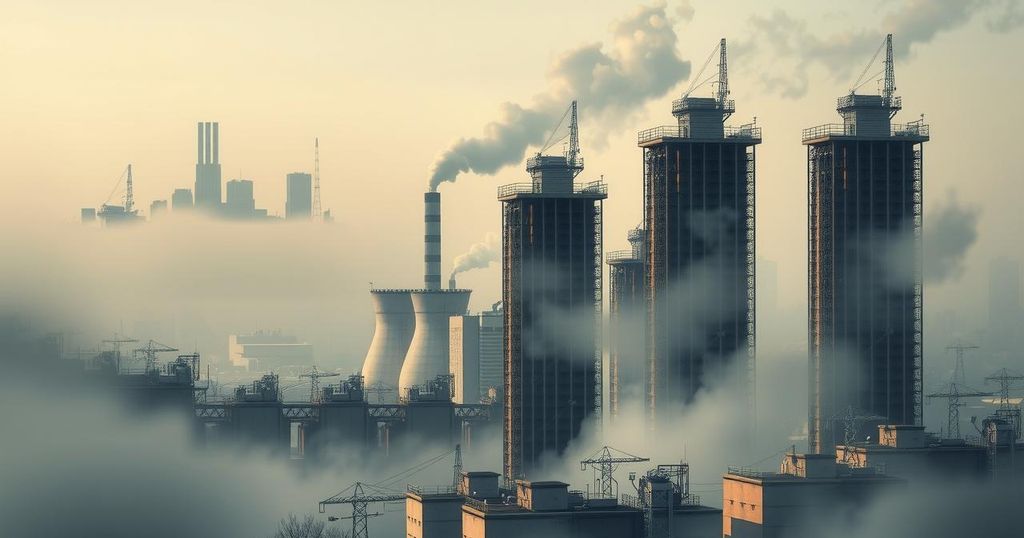Ghana, Nigeria, Chad, and Rwanda Among the World’s Most Polluted Countries

The 2024 World Air Quality Report highlights alarming pollution levels in Ghana, Nigeria, Chad, and Rwanda, marking them among the world’s most polluted nations. Chad leads with a PM2.5 concentration of 91.8 µg/m³, significantly exceeding WHO guidelines. This escalating crisis poses severe health risks, leading to tens of thousands of deaths each year, necessitating urgent environmental policy reform to combat air pollution effectively.
The 2024 World Air Quality Report has revealed that Africa is grappling with severe pollution, with Ghana, Nigeria, Chad, and Rwanda identified as some of the most polluted countries worldwide. The report emphasizes a continuing air quality crisis that poses significant health risks to millions.
Chad leads globally with a PM2.5 concentration of 91.8 µg/m³, which is nearly 18 times above the World Health Organization’s recommended limit of 5 µg/m³. Nigeria ranks 11th with 40.1 µg/m³, while Rwanda’s level stands at 40.8 µg/m³, ranking it 9th, and Ghana follows as the 14th most polluted country at 35.8 µg/m³.
PM2.5 particles are harmful pollutants that penetrate deep into the lungs and bloodstream, causing severe respiratory and cardiovascular diseases. These particles are significantly smaller than typical dust particles, making them nearly invisible yet highly toxic. According to the University of Chicago’s AQLI, air pollution reduces life expectancy in polluted regions by 2.7 years.
In Ghana alone, the WHO estimates that air pollution leads to approximately 28,000 deaths each year. Globally, air pollution resulted in 8.1 million deaths in 2021, averaging 22,192 deaths daily, and tragically, one child dies every minute due to related health issues. Without intervention, air pollution will continue to be a significant health threat.
Ghana’s air pollution problem has escalated, now exceeding the WHO’s safe limits by seven times. Accra is ranked the 16th most polluted capital city globally, with a PM2.5 level of 36.3 µg/m³. However, Kumasi has emerged as the most polluted city in Ghana, registering 39.5 µg/m³ for the first time in this report.
Ghana’s pollution levels have alarmingly increased over the years, with its ranking climbing from 27th in 2022 to 14th in 2024. In 2022, PM2.5 levels were reported at 30.2 µg/m³, rising to 33.2 µg/m³ in 2023 and reaching a record 35.8 µg/m³ in 2024.
The report indicates that five of the top ten most polluted countries are in Africa, and only 24 out of 54 African nations reported any air quality data due to inadequate monitoring infrastructure. A significant percentage of African cities reported PM2.5 levels 3 to 7 times above WHO guidelines, posing serious health risks.
The air pollution crisis in Ghana is a public health emergency. Estimates suggest that about one Ghanian dies every 19 minutes from air pollution-related health issues. Persistent high PM2.5 levels indicate that if current trends continue, monthly deaths could exceed 2,333 due to toxic air exposure.
The economic consequences of Ghana’s pollution crisis are profound, with potential costs reaching $137.8 billion by 2040 if no prompt actions are taken. PM2.5 exposure has been linked to various health issues, emphasizing the urgency for mitigation measures.
Globally, only 17% of cities meet the WHO air pollution guidelines. The report identifies Chad, Bangladesh, and Pakistan as the top three most polluted countries, while countries like Australia and New Zealand rank among the cleanest.
Key factors contributing to Africa’s air pollution crisis include rapid urbanization, population growth, and industrial emissions. Notably, non-governmental organizations now contribute 67% of all air quality data in Africa, showing a significant increase in the need for improved government-led monitoring.
In response to the escalating air quality crisis in Ghana, experts are advocating for stronger environmental policies. Recommendations include enforcing vehicle emission regulations, investing in renewable energy, expanding air quality monitoring stations, and implementing strict anti-burning measures. Without immediate action, Ghana’s air quality issues could lead to more severe consequences in the near future.
In summary, the 2024 World Air Quality Report underscores a significant air pollution crisis in Africa, with Ghana, Nigeria, Chad, and Rwanda recognized among the most polluted nations. The alarming rise in PM2.5 levels poses serious health risks, leading to thousands of deaths annually. Urgent actions are needed to reform environmental policies to mitigate this growing crisis. The statistics serve as a wake-up call for the respective governments and communities to address air pollution effectively to protect public health and wellbeing.
Original Source: www.myjoyonline.com







